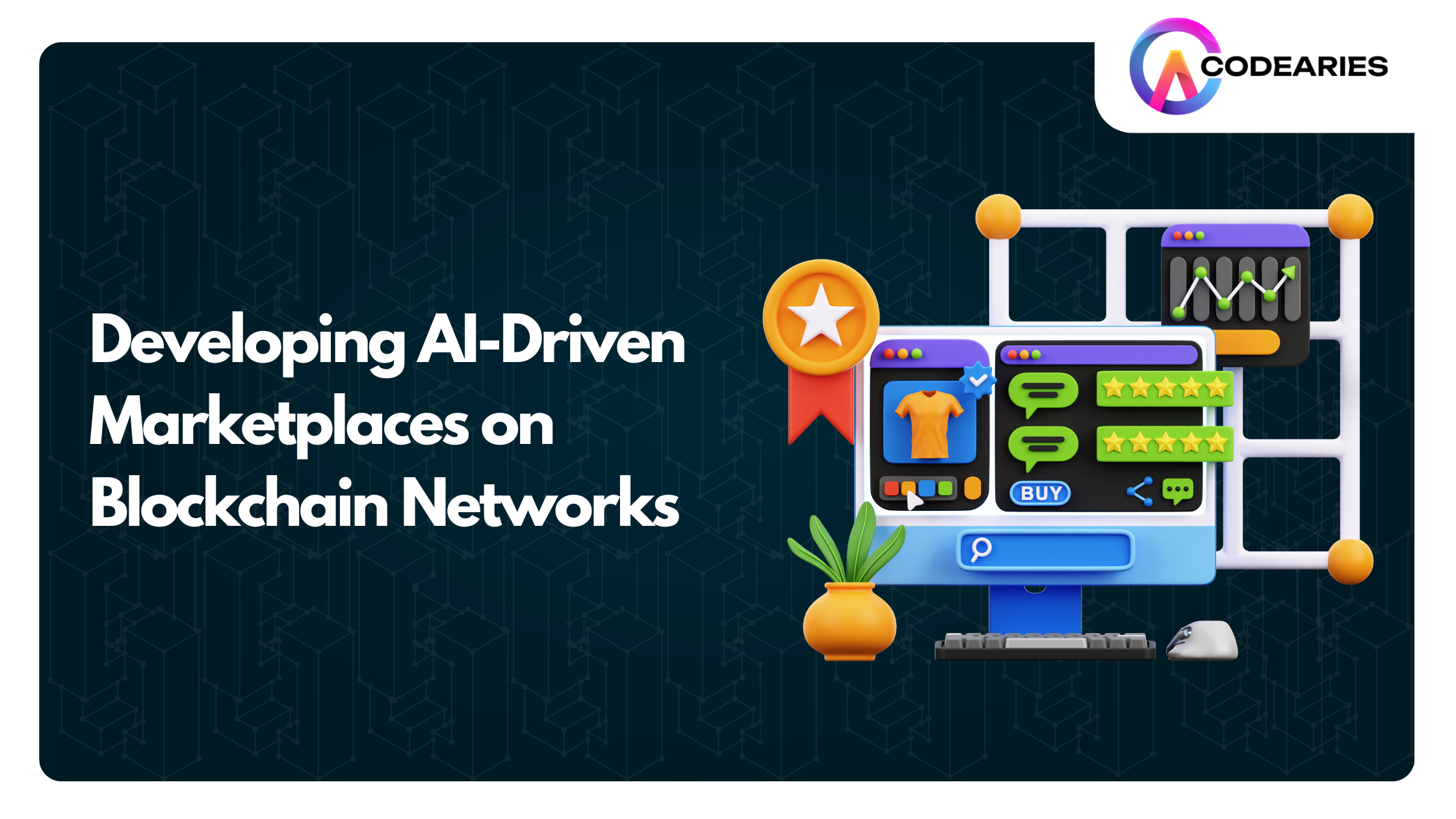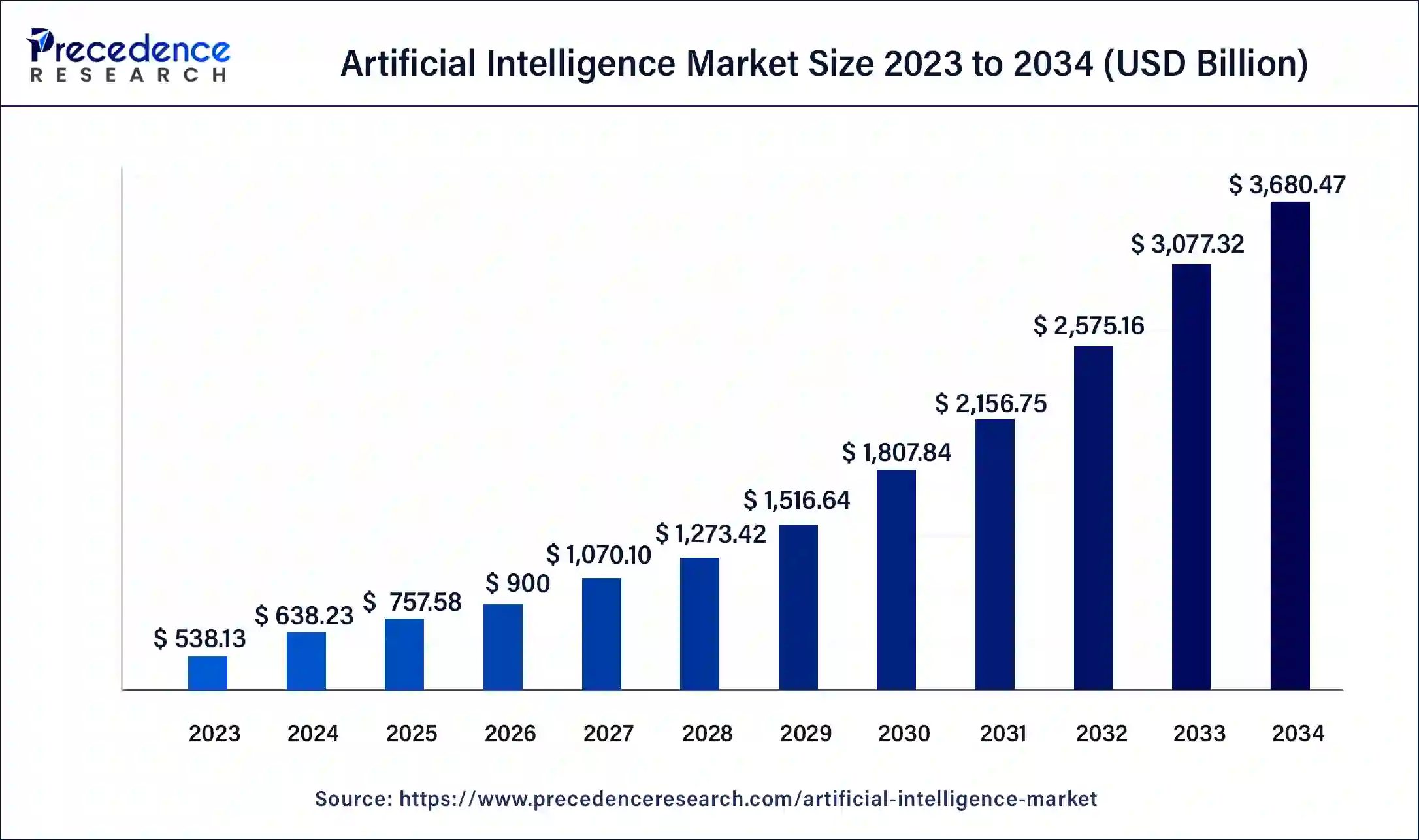
AI-driven marketplaces are revolutionizing how goods and services are exchanged, blending the power of artificial intelligence (AI) with the robustness of blockchain technology. This combination not only optimizes operations but also provides heightened security, transparency, and efficiency, transforming various sectors and unlocking new potential.
Blockchain, the decentralized ledger behind cryptocurrencies like Bitcoin and Ethereum, ensures transaction integrity by recording data across multiple nodes. Meanwhile, AI enhances these platforms by automating decisions, providing personalized recommendations, and streamlining complex data processes, making marketplaces smarter and more user-centric.
In this article, we explore how AI-driven marketplaces are shaping the future of commerce by integrating cutting-edge AI technologies with blockchain’s decentralized security.
The Evolution of Marketplaces
Historically, marketplaces were physical locations where buyers and sellers met. With the rise of digital platforms, global trade flourished, reducing transaction costs but often introducing problems like data breaches, monopolistic behavior, and opacity. AI and blockchain represent the next evolutionary leap, enabling decentralized, secure, and autonomous marketplaces that foster user trust. AI-driven algorithms can optimize pricing, automate customer service, and streamline matchmaking, while blockchain maintains a transparent, tamper-proof transaction history.
Understanding Blockchain’s Role
Blockchain is a distributed ledger that securely records data across multiple computers in a network. It ensures:
- Decentralization: No single point of control, reducing vulnerabilities.
- Immutability: Once recorded, data cannot be altered, providing a permanent record.
- Transparency: Every participant in the network has access to the same information, promoting trust.
These characteristics make blockchain an ideal complement to AI-driven marketplaces, where security, trust, and data integrity are vital.
AI’s Impact on Modern Marketplaces
Artificial Intelligence (AI) is transforming the way modern marketplaces function, introducing a new era of efficiency, personalization, and innovation for both businesses and consumers. From customized shopping experiences to streamlined customer support, AI is becoming a critical driver of success across various industries. The global artificial intelligence (AI) market size accounted for USD 638.23 billion in 2024 and is expected to reach around USD 3,680.47 billion by 2034, expanding at a CAGR of 19.1% from 2024 to 2034.
Key Areas of Impact
Here are some of the most important areas that are influenced:
Personalized Shopping Experiences
- Tailored Product Suggestions: AI algorithms analyze a wealth of customer data to generate highly personalized product recommendations, significantly boosting user satisfaction and conversion rates.
- Predictive Consumer Behavior: AI can forecast future buying patterns, enabling businesses to proactively offer relevant products or services, anticipating customer needs before they arise.
Efficient Inventory Management
- Accurate Demand Forecasting: AI-powered tools provide precise predictions of product demand, helping businesses avoid overstocking or running out of inventory.
- Supply Chain Optimization: AI enhances supply chain operations by pinpointing the most efficient routes and suppliers, minimizing operational costs and improving delivery timelines.
Enhanced Customer Service
- AI-Powered Chatbots: Virtual assistants can handle routine customer queries around the clock, freeing human agents to focus on more intricate tasks that require critical thinking and empathy.
- Sentiment Analysis: AI analyzes customer feedback and reviews to identify emerging trends and areas needing improvement, contributing to better customer experiences and more informed business decisions.
Fraud Detection and Prevention
- Anomaly Detection: AI systems can detect suspicious or unusual behavior patterns, helping businesses mitigate fraudulent activities before they escalate.
- Risk Assessment: AI can evaluate the risk profile of customers in real-time, enabling companies to make smarter decisions on lending, credit approvals, or other risk-based interactions.
Optimized Marketing Campaigns
- Targeted Advertising: AI allows marketers to segment audiences with greater precision, ensuring ads reach the most relevant consumers, thus increasing the effectiveness of marketing spend.
- Automated A/B Testing: AI can swiftly conduct A/B tests, analyzing various marketing strategies and providing insights into which campaigns are most successful in driving conversions.
Examples of AI in Action
- Amazon’s Recommendation Engine: By using AI to analyze purchase history and browsing patterns, Amazon delivers personalized product recommendations that enhance the shopping experience.
- Netflix’s Content Suggestions: Netflix leverages AI algorithms to recommend shows and movies tailored to individual viewer preferences, keeping users engaged and satisfied.
- Self-Driving Delivery Vehicles: Companies like Nuro are utilizing AI to develop autonomous delivery vehicles, which improve operational efficiency and lower the cost of last-mile delivery.
The Synergistic Power of AI and Blockchain in Marketplaces
The combination of AI and blockchain is revolutionizing marketplaces by enhancing trust, transparency, and efficiency.
- Trust and Transparency: Blockchain’s immutable ledger ensures tamper-proof records, while AI automates smart contracts, reducing fraud.
- Supply Chain Management: Blockchain enables product traceability, and AI monitors quality control using sensor data.
- Personalized and Secure Transactions: AI verifies identities securely and offers tailored recommendations based on blockchain data.
- Efficient Operations: AI automates processes, while blockchain eliminates intermediaries, reducing costs and improving transaction speed.
Together, these technologies are transforming commerce with smarter, safer, and more efficient systems.
Types of AI-Driven Marketplaces on Blockchain
The fusion of AI and blockchain is giving rise to new and innovative marketplace models. Here are some of the most prominent types:
Decentralized Autonomous Marketplaces (DAMs)
- Governance: These platforms operate without central authorities, using smart contracts for automated decision-making.
- Tokenization: Assets in DAMs are often represented as tokens, providing proof of ownership or participation.
- Examples: NFT platforms like OpenSea and Rarible, and decentralized exchanges like Uniswap and PancakeSwap.
AI-Powered Supply Chain Marketplaces
- Traceability: Blockchain ensures transparency and product authenticity by offering end-to-end tracking of goods.
- Quality Monitoring: AI analyzes data from the supply chain to assess product quality and identify potential issues early.
- Examples: IBM Food Trust, Walmart’s blockchain-based food traceability initiative.
Predictive Analytics Marketplaces
- Data Sharing: These marketplaces enable participants to share data securely for more accurate predictive analytics.
- AI Insights: AI tools analyze shared data to generate valuable insights, helping businesses make data-driven decisions.
- Examples: Ocean Protocol, SingularityNET.
Personalized Recommendation Marketplaces
- AI-Powered Suggestions: These platforms use AI to provide tailored product recommendations based on user behavior and preferences.
- Blockchain Security: Blockchain protects user data, ensuring privacy and building trust in personalized services.
- Examples: AI-driven advertising platforms and e-commerce sites offering custom recommendations.
AI-Powered Insurance Marketplaces
- Risk Evaluation: AI algorithms more accurately assess risks for policies, enabling fairer and more competitive pricing.
- Smart Contracts: Blockchain automates insurance claims and enforces transparency in policies.
- Examples: Decentralized insurance platforms like Nexus Mutual and Aavegotchi.
AI-Driven Job Marketplaces
- Talent Matching: AI matches job seekers with opportunities by analyzing skills, experiences, and preferences.
- Skill Verification: Blockchain securely verifies credentials, ensuring authenticity in qualifications and certifications.
- Examples: Platforms like Bounties Network and Jobcoin.
These diverse AI-driven blockchain marketplaces are revolutionizing various industries, and as the technologies mature, we can expect even more groundbreaking models in the future.
Smart Contracts: The Foundation of AI-Driven Marketplaces
Smart contracts, self-executing agreements with coded terms, are crucial in AI-driven marketplaces. They automate transactions securely and transparently, eliminating the need for intermediaries.
Key Functions of Smart Contracts
- Automation: Smart contracts handle tasks like:
- Order Fulfillment: Automating transactions when payment is received.
- Dispute Resolution: Settling disputes based on pre-programmed rules.
- Payment Processing: Enabling secure, real-time transactions.
- Transparency: Hosted on public blockchains, smart contract terms are visible to all, promoting trust and accountability.
- Security: Blockchain ensures contracts are tamper-proof and immutable, protecting against fraud.
- Efficiency: Smart contracts reduce the need for intermediaries, streamlining transactions and cutting costs.
- AI Integration: Combining AI and smart contracts allows for advanced capabilities, such as:
- Predictive Analytics: Triggering actions based on AI-driven forecasts.
- Personalized Recommendations: Using blockchain data to suggest tailored products.
- Risk Assessment: AI can adjust contract terms in response to dynamic risk factors.
Applications of Smart Contracts
- DeFi: Automating lending, borrowing, and trading.
- Supply Chains: Ensuring transparency and tracking product movement.
- Insurance: Streamlining claims processing.
- Gaming: Verifying fair outcomes in decentralized games.
In summary, smart contracts enhance AI-driven marketplaces by automating, securing, and simplifying operations. Their integration with AI unlocks new possibilities, making them a vital component of future digital commerce.
Future Trends and Innovations
The future of AI-driven marketplaces on blockchain is poised for transformation, driven by key trends that enhance efficiency, transparency, and personalization. As consumer awareness grows and regulatory frameworks become clearer, we can expect widespread adoption of these marketplaces. AI will deliver increasingly tailored recommendations, while smart contracts offer greater customization options. The integration of IoT will enable real-time data analysis, further boosting insights and operational efficiency. Additionally, standardized interoperability protocols will facilitate seamless interactions between different platforms. Ethical considerations, such as bias mitigation and strong data privacy measures, will be crucial for building trust. Finally, the tokenization of assets and the rise of Decentralized Autonomous Organizations (DAOs) will open up new business models and governance opportunities, fundamentally reshaping the landscape of digital commerce.
Conclusion
AI-driven marketplaces built on blockchain are transforming the landscape of digital commerce. By combining AI’s automation and personalization capabilities with blockchain’s security and transparency, these platforms offer unprecedented benefits for businesses and users alike. As technology continues to advance, AI-driven marketplaces will redefine how goods and services are exchanged, creating new opportunities across industries.
Get Started with Developing Your Marketplace with Codearies
At Codearies, we empower you to kickstart your marketplace development journey with a streamlined approach tailored to your unique vision. Our team of experts collaborates closely with you to define your goals and identify your target audience, ensuring a customized strategy that aligns with your business objectives. We leverage cutting-edge technologies and innovative solutions to build a robust marketplace that is not only user-friendly but also scalable. With our commitment to security, seamless UI/UX design, and ongoing support, we guide you through every step of the process, from initial concept to launch and beyond. Let’s transform your marketplace idea into a thriving digital reality together!
FAQS
What is Proof of AI Blockchain?
Proof of AI Blockchain is a consensus mechanism that integrates artificial intelligence into blockchain operations. It uses AI algorithms to validate transactions and ensure network integrity, enhancing security and efficiency. This approach allows for more adaptive and intelligent processing, enabling smart contracts and decentralized applications to function more effectively.
What is the Role of AI and Blockchain Technology in Marketing?
AI and blockchain technology in marketing enhance data security, personalization, and transparency. AI analyzes consumer data to generate insights and tailor marketing strategies, while blockchain ensures that this data is secure, verifiable, and accessible, fostering trust between brands and consumers. Together, they create more effective, data-driven marketing campaigns.
How Does Blockchain Work in Digital Marketing?
In digital marketing, blockchain enables secure and transparent transactions by recording interactions on a decentralized ledger. This technology helps track consumer behavior, verify ad placements, and prevent fraud. By ensuring data integrity, blockchain enhances trust and accountability in marketing efforts, allowing brands to make informed decisions based on reliable data.


